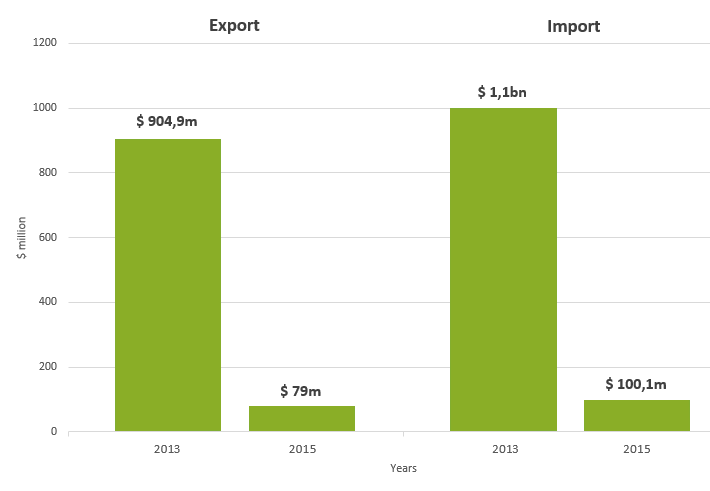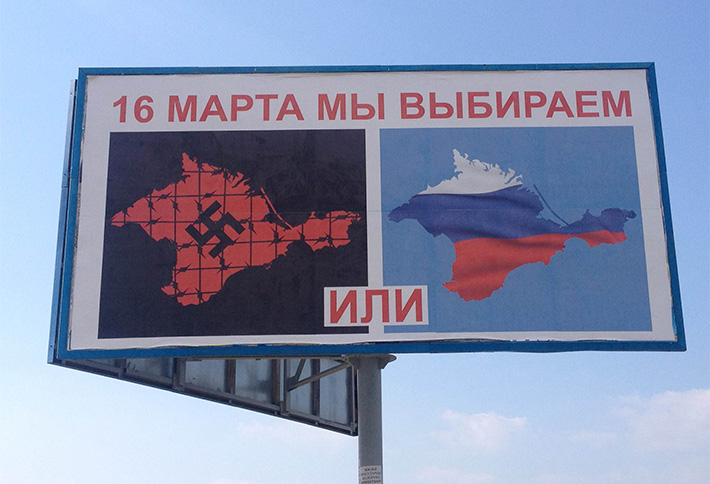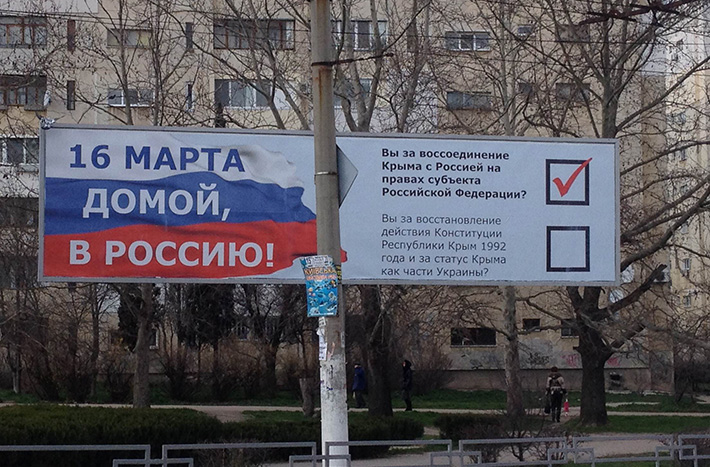Anniversary of the Crimean referendum: occupation myths
Two years ago, on March 16th, 2014, the referendum on joining the peninsula to Russia was held in Crimea. According to local "authorities", over 97% of the Crimean people voted as "yes". Russian authorities spared no expense for Crimea and prepared a real celebration: fireworks, concerts, mass celebrations, demonstrations ... And only when they woke up the next morning, on March 17th, the locals began to feel the effects of their exultation: frozen bank cards and accounts, crowds of people began to buy massively home appliances and other products and the worst thing is uncertainty in the future.
Since then Crimea has experienced a lot: from deficit of milk and medicines to total immersion into the darkness as a result of the energy blockade. The occupation authorities have been feeding locals with promises that "just a bit more" and you will live and feel better and blaming Ukraine for all the troubles. At the same time, the tourism industry shows a decline, the peninsula is cut off from the civilized world, food prices are shooting up. On this background there are still repressions against the Crimean Tatars and local activists who have not sold out to the occupation authorities and are not afraid to express their opinion in their native region.
Key economic "achievements" of the Crimea
During 2015 the volume of the Crimean export fell by 11.5 times in comparison with 2013 when the peninsula was still a part of Ukraine. In the past tCrimea exported goods for $ 79 million, in 2013 - $ 904.9 million. The situation is similar with import which fell by 11 times in two years: $ 100.1 million in 2015 versus $ 1.1 billion in 2013.

At the same time, Ukraine is a major trading partner of Crimea today. More than 30% of exports from the peninsula and 40% of import are conducted with the Ukrainian side.
The peninsula has become a leader for two years. But at the end of the table that is evidenced by the rating of the living standard in the regions of Russia. According to the RIA Rating, Crimea took 76th place out of 85 possible. It is better to live even in Chechnya, Yakutia and Buryatia that took 75th, 73rd and 72nd places respectively.
Vice Prime Minister of the Republic Vitaliy Nakhlyupin told in early March about the fact that Crimea showed the worst results in the development of Russia's budget in 2015. Russian politician explained that there were such "objective" reasons as power blackout and late entry of money on the peninsula.
"The total amount of outstanding commitments of all subjects of the Russian Federation in 2015 amounted to 75 billion rubles, the figure of Crimea and Sevastopol is 9 billion. In other words, we have the worst performance of all the subjects of the Russian Federation," - he admitted.
We should also tell about the prices on the peninsula which have begun to soar since the first days of the "Crimean Spring". In 2015 inflation on a peninsula officially reached 26.4% compared to 12.9% in whole Russia. The local "authorities" explained it by rapid growth in wages and transport problems.
According to local residents, food prices have increased on average by 2-3 times for two years. Crimeans are saved only due to products of local production and Ukrainian imports. For example, 1 kg of bananas cost about 12 UAH in Simferopol in 2013, and today - 120 Russian rubles (38 AUH at the average exchange rate), 1 kg of chicken - 260 rubles today (about 90 UAH) compared to 35 UAH in 2013.
"We still buy Ukrainian products as we used to. Nothing has changed. Supermarkets have very few products from Ukraine, so people started to go to markets where Ukrainian vegetables, fruits, dairy products, sausages, cheese, ketchup, mayonnaise, conservation, sweets and so on are brought from Ukraine either legally or illegally. Similar Russian products are much more expensive and there is still a difference in the quality but not in favour of products from the mainland of the Russian Federation. There is also local production but limited and minimal. It is basically bread, milk, eggs, meat. Prices are low but because of their deficiency people are standing in line to buy, for example, Dzhankoy milk or sour cream in the morning. I'm going back from work at about 18 p.m. and shelves with local milk are always empty," - told Ekaterina Simferopol to OstroV.
At the end of September 2015 Ukraine started the so-called "trade embargo" of Crimea. Activists blocked the road for trucks, so that Ukrainian goods are not delivered to the peninsula. In December the blockade resulted in the adoption of the resolution "On Restrictions on supplies of certain goods" in both directions by the Cabinet of Ministers of Ukraine. But, according to the OstroV, Crimea continues to get Ukrainian banned products.
According to official data of the RF Ministry of Economic Development, the cost of the minimum food basket per month on average in Russia at the end of December 2015 amounted to 3 589.9 rubles. The figure is higher in Crimea and amounted to 3 698.5 rubles. It is noteworthy that the same set of products is cheaper in the Central Federal District (the capital - Moscow) than on the occupied peninsula and is 3 656.3 rubles.
According to local residents, many visitors from major Russian cities such as Moscow and St. Petersburg complained that prices were "very close to those in the capital city" in Crimea. And the situation is like that on the background of weak service, infrastructure and low wages (compared to metropolitan areas of the Russian Federation).
"Our hospital has recently been checked by Moscow inspection. They stayed in Sevastopol for a week and were shocked by prices and living standards. Russian products are more expensive in the city supermarkets than in Moscow, local products are not much cheaper. They told us secretly that the usual salary of a doctor in the Russian capital started with 50 thousand rubles while in Crimea many doctors received 15 thousand," - said a resident of Sevastopol.
Crimean "authorities" like to tell that salaries on the peninsula have increased by several times and prices have soared just a bit. It’s easy to trace how salaries increased. Monitoring of the all-Russian Internet portal called Work in Russia shows that, for example, sellers in Simferopol are offered a salary of 7,200 rubles a month, while in Moscow – starting with 20 thousand and even more.
According to official data of Crimea statistics, the average salary was 21,619 rubles on the peninsula in December last year. But statistics says nothing about the fact that only soldiers get 30 000 and more in Crimea. Government officials - judges, prosecutors, deputies and so on also get high salaries. However, the situation is radically different in the private sector. They offer real wages of 7000 rubles per month.
According to OstroV, salary in small towns of Crimea (Alushta, Sudak, Chernomorsk, Saki) is about 5-10 thousand rubles per month. For example, a journalist of a local newspaper in Saki gets 6,500 rubles a month and a nurse in the Sudak clinic – 8000, district administrator in Alushta hotel - 9000-10000.

"Free" medical services
Crimean authorities tell about their achievements in the development of free and affordable medical services. Indeed, according to official information, all holders of compulsory health insurance (CHI) receive free medical care. However, only citizens of the Russian Federation (with a Russian passport) can get that insurance, the rest (visitors, forced migrants) can only rely on emergency aid. In addition, there are cases when residents of Crimea (with Russian citizenship) got refusals in free medical care. It is also a fact of corruption.
It is almost impossible to make an appointment with specialized doctors in Sevastopol state polyclinics without connections or bribes. To do this, a patient must first get an appointment with her therapist, who after the examination must decide whether it is necessary to send patient to another doctor. According to OstroV, therapists have received a secret order to reduce the number of such directions to the "extreme necessary minimum."
"A year ago the chief doctor gathered all the therapists of the clinic in his office and said that he had got an informal order so that we do not send patients to specialized doctors for examination. Firstly, there are not many of such doctors, the budget of the clinic does not allow to employ many of them. Secondly, it can create agio and lines which can have negative impact on the clinic. Thirdly, many examinations which we have to do for free and the equipment is very old, there are not enough new employees. We won’t manage the situation," - shared one of the Sevastopol therapists with OstroV.
According to her, corruption component in public hospitals and clinics has only grown with the introduction of "free medicine". Patients have to give from chocolates to 500 rubles to make an appointment with "free specialized doctor". Analysis and repeated appointment are another story.
The situation is not better in hospitals. There is an order from the top: treat all patients for free, providing them with full medicines and bandages, syringes, cotton, etc. There is a tiny "but": you can only give the things that are available in this or that hospital. For example, a man after surgery needs medicine. Here comes a nurse and says that it is over, then offers him to wait for a new supply, buy at the pharmacy or nurse can sell it "for a very reasonable price". It is obvious that the patient will be forced to buy all the necessary medicines.
"It happens all the time. Yes, we have strict instructions to treat for free and provide all the medicine. It is not possible. Of course, we give usual antibiotics, painkillers. But we don’t have most of the drugs and that's a fact. We say that to our patients. I'm not talking y about the fact that the staff steals the drugs, both at the lowest and at the highest levels. It’s a simple scheme which everyone knows. Logistical support of hospitals and clinics is weak, so we can’t talk about free medical care, it does not exist,"- says a doctor of one of Simferopol hospitals.
Energy collapse continues
At the end of November 2015 Crimeans fully realized the sad consequences of the "Russian world" when on November 22nd the entire peninsula sank into the darkness. It happened as a result of undermining the pylons of transmission lines in Kherson region in Ukraine. Russian occupation authorities apparently forgot to tell citizens about the full energy dependence of Crimea from Ukraine.
Residents of the peninsula spent a few weeks in a real medieval era. In the evening thousands of candles were lit in the windows of houses and the Crimean authorities only blamed Ukraine. They were only able to provide hospitals and public buildings with energy by their own forces but not in all cities. Chaos started in Crimea, the locals started to buy long-term storage products, candles, batteries, flashlights massively. Banks, ATM machines, public transport (trolley buses and trains) didn’t work.
Vladimir Putin dealt with the situation personally. On December 2nd he gave the signal for launching the first line of the energy bridge which runs along the bottom of the Kerch Strait from Kuban to Crimea. Although local authorities claim that the peninsula is fully supplied with electricity, blackouts and interruptions of the light continue even now. This is especially true in small villages. But power outages take place even in large cities such as Sevastopol, Yalta, Yevpatoria, Kerch mosyly during rush hours.
"In Sevastopol power outrage on average lasts 4 hours a day but no one knows the exact schedule of power outrage. Many people complain that in some areas there is no light for 2 hours, in others - 4-6 and in some areas there are no power outrages,"- says Irina from Sevastopol.
The Russian authorities promise to deal with this problem in 2017 by building a strong energy bridge with mainland of the RF. Putin's dream is to make the peninsula completely independent from Ukraine by that tine. While the President is dreams, the locals can just be happy with the news headlined as "There will be no power outrage in Sevastopol on March 8th," "An object of the unknown civilization was found under the energy bridge to Crimea and so on.
At the same time, Petro Poroshenko said that Ukraine was ready to resume the supply of power, provided that the new treaty will indicate Crimea as a part of Ukrainian territory. Crimean authorities esponded with a categorical refusal.
"We rejected the Ukrainian power once and forever, we do not need it, we never relied on it," - said "first deputy chairman of the Council of Ministers" of Crimea Mikhail Sheremet.

Travel fiasco
It is not a secret that many Crimeans live only due to the tourism industry. About 6 million tourists came to rest in Ukrainian Crimea per year. Now this figure has fallen by almost 2 times. According to various estimations, the peninsula was visited by about 3 million people in 2014 and 4 million in 2015.
Reduction in the the flow of tourists is caused by the fact that it’s very hard to get to Crimea. You can do it by plane from Russia, that is very expensive, or by ferry but it will take several days. It’s not easier to get to Crimea from the territory of Ukraine. To do this you will need to pass 2 customs control: Russian and Ukrainian which are connected by a large pedestrian corridor. It is quite costly and tedious.
Those tourists who still come to Crimea, face high prices and low level of provided services. It’s no longer a budget holiday. Housing prices have increased by 2-3 times, many beaches are built, fenced or become chargeable.
The situation is more or less acceptable in major resort towns (Sevastopol, Yalta, Feodosiya). The situation is catastrophic in small villages: no tourists. The once thriving resorts Simeiz, Gurzuf, Alushta, Koreiz, Sudak are now in disrepair.
"I am engaged in the organization of tourist trips to the South Coast. I hired an additional staff of 10-15 people as I could not cope with the travel organization myself in Ukraine. In the summer of 2014 and 2015 I worked alone and I didn’t have any work half a time. There are few tourists. They mostly come from Russian on business trips and are not interested to go around Crimea. Someone comes because of nostalgia but quickly disillusioned when he sees new prices. In the past the situation was like that: a person worked in Moscow, received a normal salary of 40 thousand rubles. When he came to Ukrainian Crimea and exchanged money, he became rich and could have a nice holiday there. Now the same tourist would think ten times before going here with the same salary. Egypt, Turkey, at least Sochi and Anapa, are more beautiful and cheapers alternative,"- says Yevgeniy, a Crimean resident who has been working in the tourism sector on the peninsula for more than 10 years.
In general Crimea has evolved from the once sunny, tourist and prospectous region into the usual Russian hinterland for two years. New higher salaries and pensions are "eaten" by high prices that do not stop growing. It happens on the background of international isolation, transport, energy and economic challenges that Crimea faces. But Russian propaganda knows its p's and q's and continues to zombie Crimean residents with news that life in Ukraine would be much worse with "khunta", "Right Sector", war, Americans, and so on. Therefore, if a referendum were held again today, I do not know what results it would show ...
Andrey Andreyev, OstroV
